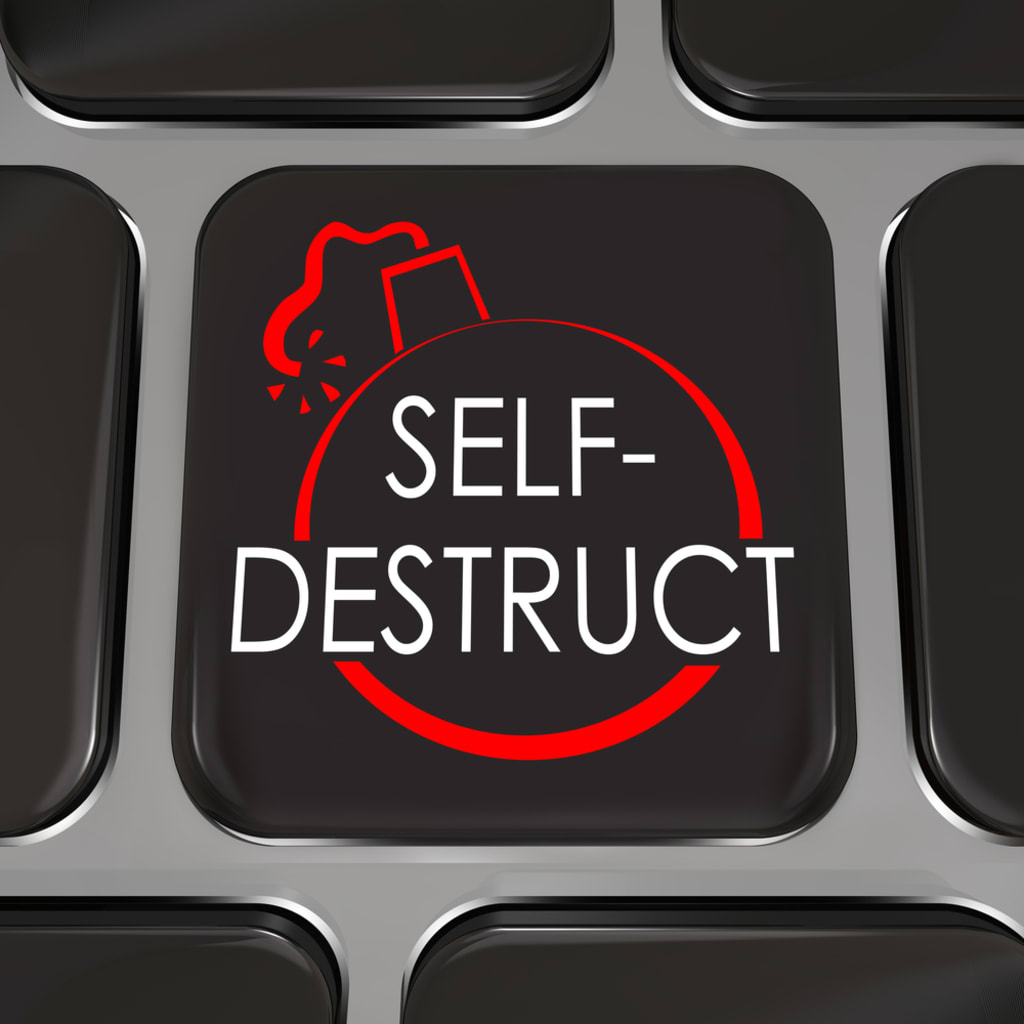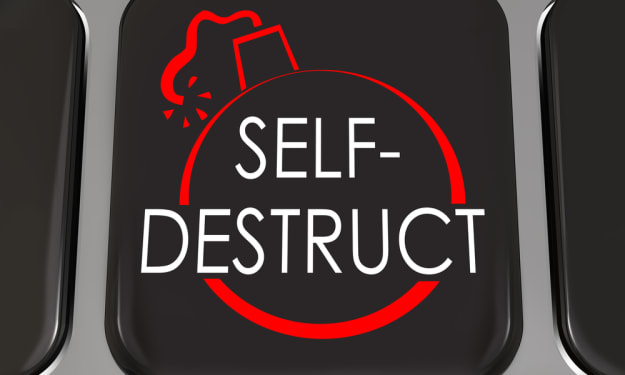
If you missed Getting Out of My Own Way, Part One, you can find that entry here!
—
The remaining four chapters from, Get Out of Your Own Way (GOOTOW) by Mark Goulston, M.D. and Philip Goldberg, that struck a chord with my self-defeating heartstrings come in pairs of two. The first pair are constantly fighting so they usually leave me stagnant and sad. The second two I use them in tandem to truly dive headfirst into a puddle of self pity. But, the good news is I’m actively working against these four, along with the previous four, everyday. I look forward to a day that they’ll be eradicated from my life.
—
Growing up, there seemed to be a general ‘how to do life’ knowledge that was taught in school, at home, in church, and by observation. The underlying theme is the title of Chapter 10, “Playing It Safe”. Between my own family and the Midwest in general, I was raised in an atmosphere of prevention, comfortability, and when I got older, maintaining stability.
Prevention from failure, heartbreak, the devil’s influence, embarrassment, rejection, and the list goes on. Not all of which are necessarily bad, but it starts to become bad when an atmosphere of prevention smothers the desire to take risks, live outside the status quo, or pursue an “unstable” dream (like being a writer).
In GOOTOW, the authors give the advice, “Don’t look where you’re going, go where you’re looking.” They also challenge readers to think back to a time they were most optimistic, idealistic, and full of dreams. I look back at my senior year of high school and freshman year in college as the most starry-eyed and “the world is my oyster” years. But, my upbringing of prevention didn’t prepare me well for the battle of maintaining that optimistic twinkle in my eye. I was an English major, and I wrote, but the entire time I kept searching for another degree to partner with English so I could get a “real” job, have a “stable” career, and be “comfortable”. I played the game. The one where you think more about building your resume to impress a faceless HR person in your distant future. The game that dries you of your creative drive because you exhaust your energy on people whose main goal is to have the “500+” label on LinkedIn.
Years later, I’m handed two degrees and haven’t written anything that wasn’t graded by a professor in years. The jobs I want, only want to see portfolios, stories, scripts, and short films beyond school assignments. And, all I had to show for my time in college was student organizations, philanthropy, and a very average GPA. I spent years laser focused on where I was going, which was down a path and up a career ladder I didn’t want. I should’ve spent those years going where I was looking during my senior and freshman years. If I would’ve, I’d have a thick portfolio of writing samples and probably have started this website years ago.
A year or so after I graduated college, I started to battle Chapter 5 from GOOTOW, “Waiting Until It’s Too Late”. Well, I should clarify, the contents of Chapter 5 revolve around death and not having to wait until something tragic happens before you realize what’s important to you. I resonated more with the thought provoking bullet points at the end of the chapter that say, “Imagine yourself at age 80, looking back at your life. Ask yourself what it would take to make you feel you had lived a meaningful life.”
I tell myself that when I’m 80 I will want to look back and see decades of my writing out in the world, making whatever kind of impact it makes. I’d want to reflect on all times I took risks pursuing something I was passionate about. I’d want to see the transformations that happened after those risks and embracing uncomfortability.
Where this chapter becomes self-defeating for me, is my melodramatic tantrums of “it’s too late” and “I’ve wasted so many years playing it safe”. I’m 26, but in those moments I see the three and a half years at college as a tremendous waste of time because I didn’t invest in my writing or creativity beyond the classroom. During that time of my life, I was living in two different ideals: my starry-eyed, dream filled life as an English major, and the “playing it safe” life by chasing opportunities that would build a one-of-a-million, generic resume.
Whether I did it for the sake of a back up plan to prevent failure, or because the concept of playing it safe was woven into the fabric of my brain (or both), it translated to “it’s too late”. Which is a big lie, and I’ve embraced this new mentality of it’s not too late if I’m still alive. This can be applied to any area of my life beyond writing, like relationships, traveling, homes, goals, etc. I want to look back on my life at 80 and see zero evidence in my timeline that I gave up on something.
—
Chapter 20 is titled “Becoming Obsessive or Compulsive” and Chapter 28 is titled “Feeling Sorry for Yourself”, and these two are partners in crime. In my last entry, I talked about my ‘control’ problem. In Chapter 20, Goulston and Goldberg say “we focus on things that appear to be controllable”, when we are faced with circumstances that push us to the edge or make us feel like we aren’t in control.
When it came to my writing, I found myself constantly “distracted” or putting my energy into other things, like above, when I talked about resume building as a backup plan. More recently however, it’s been distracting myself with cleaning the whole apartment, looking for another job that would take up all of my free time, and my biggest distraction, planning. I spend so many hours planning things for my writing. It keeps me in an occupied cycle of ideas, dreams, and goals, but that’s where they all stay. I believe planning is good, but I was using it as a distraction and became obsessed with controlling three, six, and twelve month calendars instead of just sitting my ass down and writing.
Goulston and Goldberg challenge readers to actively fight against and stop their compulsive, distracting behaviors in hopes that the root of pain or fear will reveal itself. So I took the necessary steps to eliminate these distractions, including enlisting an accountability partner (Chapter 3) – my fiancé. I quickly realized that my deeply rooted fear was simply being a bad writer. If I started writing and putting it out into the world and it was bad, I’d be a failure. Not to mention the tuition money that would’ve loomed over my head as a waste, or the years of claiming to be something that I’m revealed to be bad at.
After eliminating my compulsive behavior, I realized I was obsessed with being stuck and feeling sorry for myself. I had built a dependence on being stuck and being a victim of circumstance. This is why I say Chapter 20 and 28 in GOOTOW work together. They both keep me obsessed with wallowing in self-pity.
My excuses and reasons for feeling sorry for myself, paired with my fear of being bad, all seemed very small when I was able to identify them all. I blamed my lack of confidence in myself and my writing because growing up I didn’t feel completely supported in my passion of writing, it was treated as more of a hobby. I blamed my stagnancy on wasting all my energy on resume building in college instead of fostering my creativity. I blamed my lack of progress on “it’s too late” and “I should’ve started this years ago”. It was all very elaborate reasoning and, at the same time, very pathetic. And, I say pathetic because deep down all of those situations, as true or as dramafied as they may have been, had the root of self-doubt and fear of being bad. How can I blame my parents or hometown for my lack of commitment to writing, when I don’t even believe in myself? How can I blame college for my lack of passion, when I’m not expressing my passion? How can I blame anyone or thing, but myself for my lack of confidence? I can’t. I expected others to believe in me more than I did before I could believe in myself, and that’s simply not how it works.
One of the bullet points at the end of Chapter 28 is “Realize that [Feeling Sorry for Yourself] is an enormous waste of time and energy, and a drain on other people.” And, since I’ve stopped feeling sorry for myself and wasting my energy on obsessing over self-pity, I feel much less exhausted.
—
Thank you for reading! Get Out of Your Own Way by Mark Goulston, M.D. and Philip Goldberg is available in lots of places, but here’s the Amazon link. Let me know if you resonate with any of these eight behaviors I talked about!
Citation:
Goulston M.D., Mark. Goldberg, Philip. Get Out of Your Own Way. New York, Penguin Random House LLC, 1996.
About the Creator
Athan
Writer living in the Southern California desert | website www.byathan.com






Comments
There are no comments for this story
Be the first to respond and start the conversation.